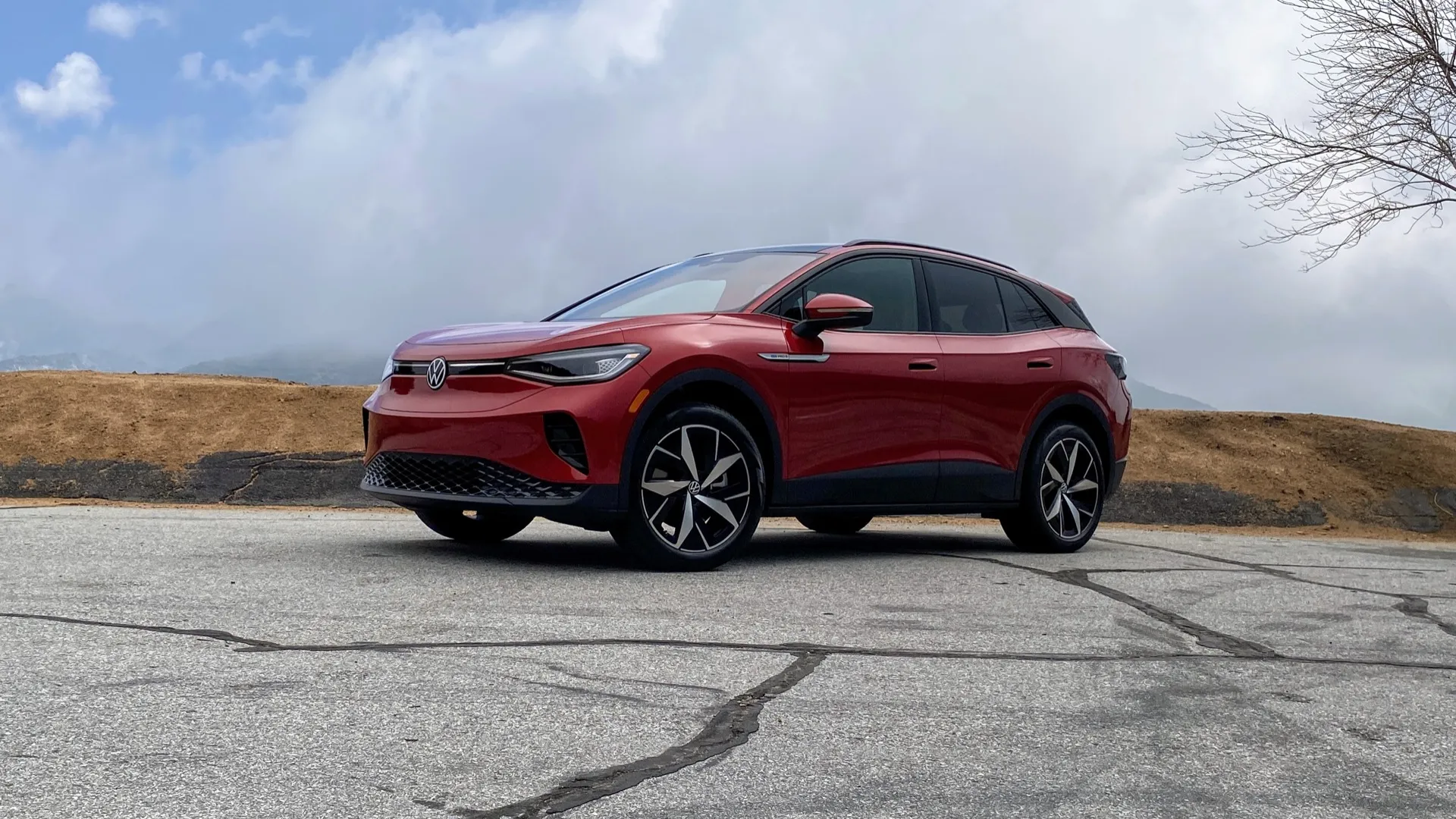VW has made things right, just in the nick of time.
Ahead of the arrival of the much, much anticipated ID.Buzz electric van and the aero-savvy, road-trip-ready VW ID.7 hatchback, Volkswagen has set the stage with a wholesome family-ready EV that delivers in nearly every aspect.
It’s a stage that the brand set years ago. Well before the arrival of the ID.4 (early in 2021 for North America), VW touted it as the EV that mainstream shoppers would be able to comprehend—and easily see as superior to top-sellers like the Toyota RAV4, Honda CR-V, or Subaru Forester.
2024 Volkswagen ID.4
In short, I love the way the 2024 VW ID.4 rides, drives, and handles in its intended lens. With a well-equipped, spacious, very smartly laid out interior, relatively quick charging, and range that holds up in the real world, it’s exactly what’s needed for those people crossing over into the EV realm for the first time.
When the ID.4 originally arrived, VW seemed to forget about how those mainstream crossover drivers were used to relatively simple interfaces. It didn’t match that mainstream ethos at all. Relying on haptic (touch-sensing) controls below the screen plus a set of haptic buttons and surfaces on the steering wheel, the interface felt like a work in progress, similar to the efforts of an off-brand tablet-maker.
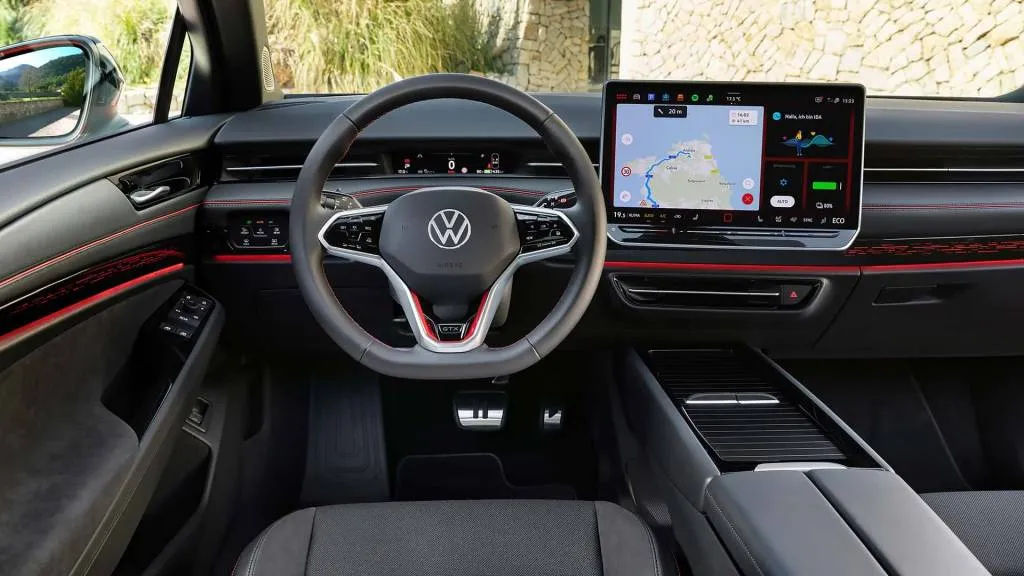
2025 Volkswagen ID.7 GTX Tourer
ID.4 interface now feels built for EV drivers
Now, VW has remade the interface into something that feels conceived by people who actually would drive, use, and charge the vehicle. A new 12.9-inch interface for all but the base ID.4 Standard model offers far faster processing power. Climate functions “stick” to the bottom of the screen, while a tray of shortcut icons at the top get you to key functions quickly. Submenus appear on the left side and open to the right. More screen menus explain the why and what, in tabs taken from Tesla. It all makes a lot more sense.
This new hardware has speed on its side and it responds without latency—always an imperative where the driver has to momentarily match their finger to a point on a screen for icons or menus.
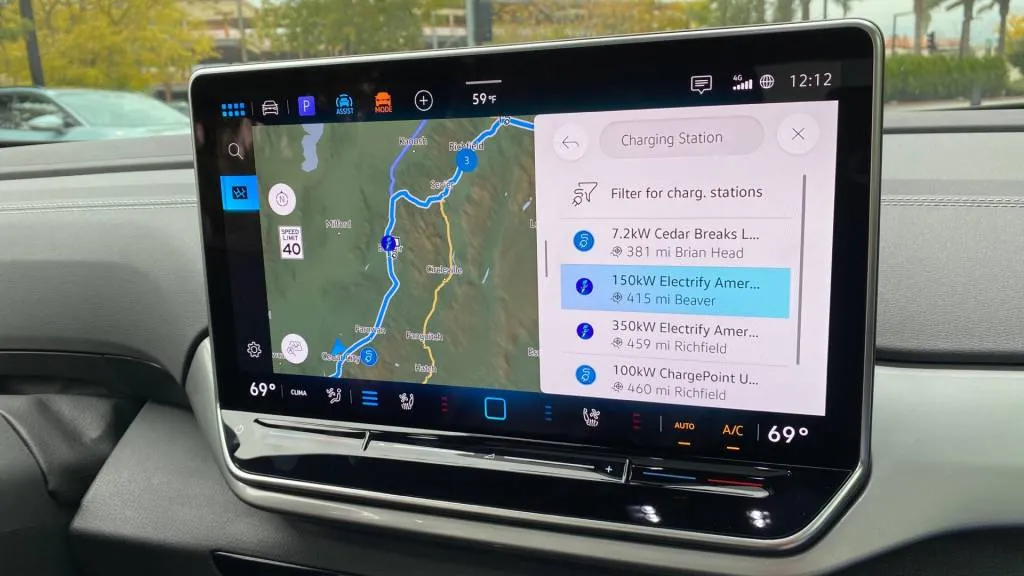
2024 Volkswagen ID.4
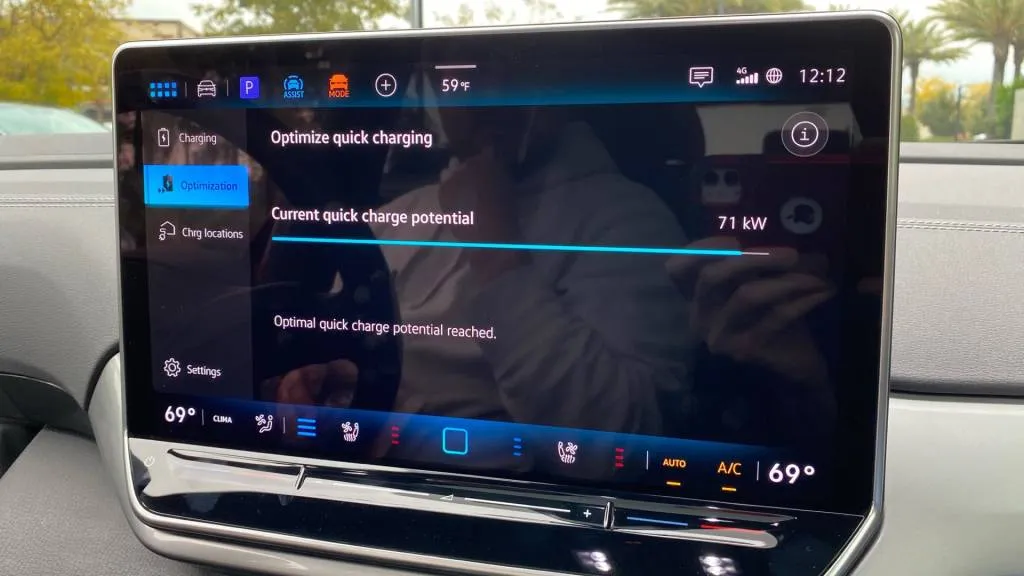
2024 Volkswagen ID.4
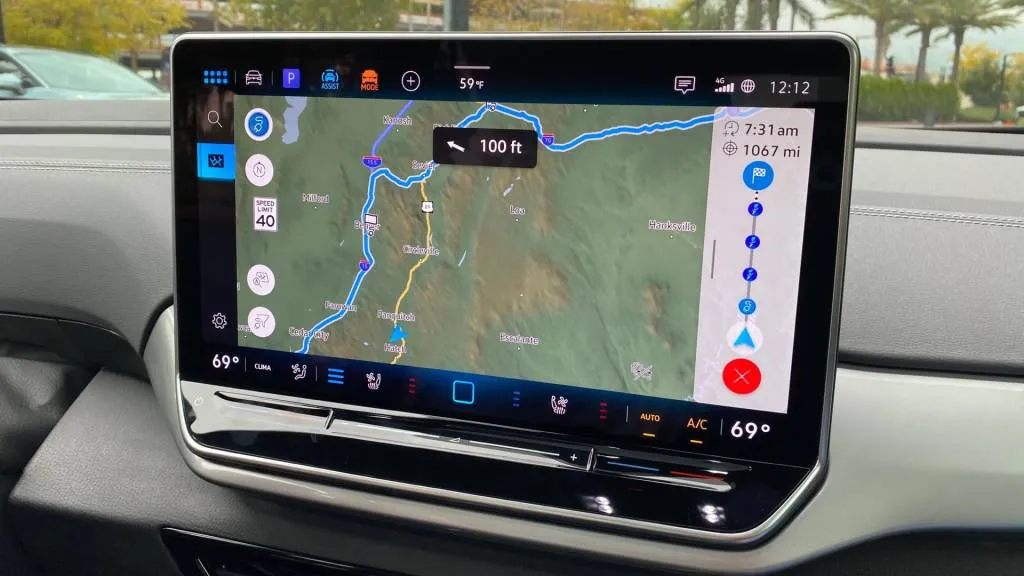
2024 Volkswagen ID.4
Within a few minutes clicking around the screen, it was easy to see how clear this is going to be for newbies. Trip planning features are built into its native navigation, and it’s easy to tweak the route for a different charger along the way. The system tells you what your max DC fast-charging rate will be when plugged in, so you’re not left second-guessing if it’s the charger. And you can easily start battery preconditioning for fast charging stops—with the press of a virtual button or automatically—and actually see what you’re going to gain in the process.
And yes, you can still pair your iPhone or Android handset wirelessly with Apple CarPlay or Android Auto, ignore most of the menu, and relish the ID.4’s mostly standard and straightforward switchgear otherwise. It does have turn-signal stalks, door handles, traditional steering-wheel adjustments, and mirror controls, although you’re still bound to stumble on the one-fits-all power-window controls combining the front and rear windows in one switch.
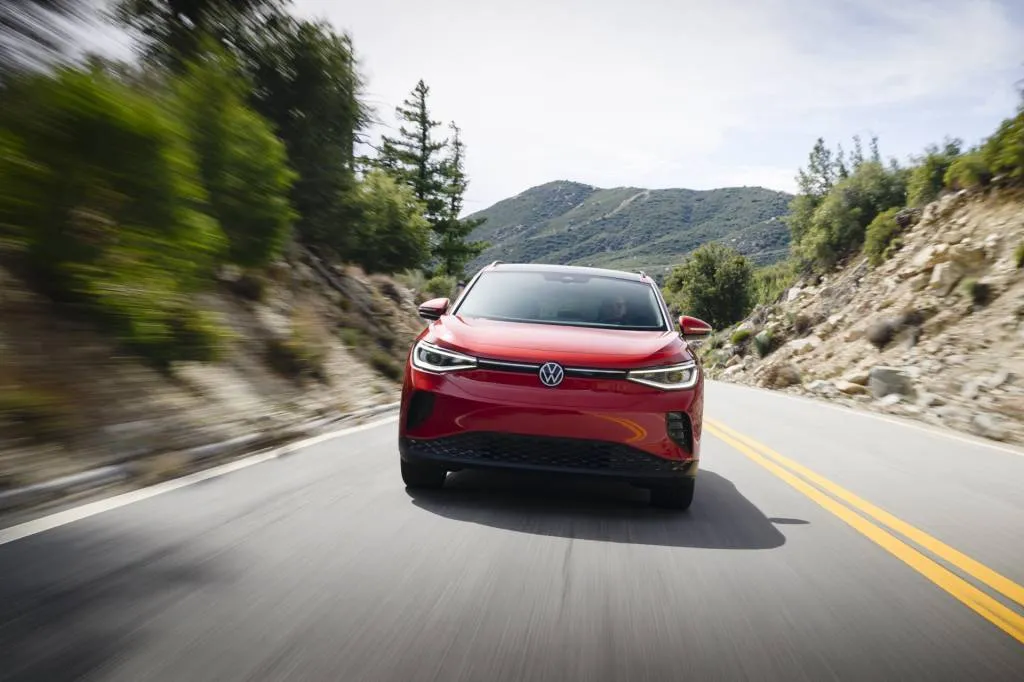
2024 Volkswagen ID.4
More punch, more range
What underpins the ID.4, in a dynamic sense, has always felt perfectly aligned with the mission, and perfectly tuned for ride, handling, and comfort, together, in a way unlike most of its market rivals. In its refresh for 2024, VW has kept all those good parts but made it even better with quicker acceleration from a new rear motor unit designed internally at VW, and termed AP550. It’s also used in the upcoming ID.7.
Output jumps most substantially in rear-wheel-drive versions with the 82-kwh (77 kwh usable) battery pack—to 282 hp and 402 lb-ft of torque from the previous 201 hp and 229 lb-ft. Dual-motor-AWD versions also get a bump, to 335 hp from the previous 295 hp. The front motor in AWD versions, an induction unit rated at 107 hp and 119 lb-ft, carries over.
Getting that new rear motor unit boosts performance and efficiency, with AWD versions now capable of getting to 60 mph in just under five seconds. Meanwhile, EPA ratings get a slight boost for the AWD model, to 263 miles, versus the previous 255 miles, and to 291 miles for the single-motor rear-wheel-drive version, from 275 miles before.
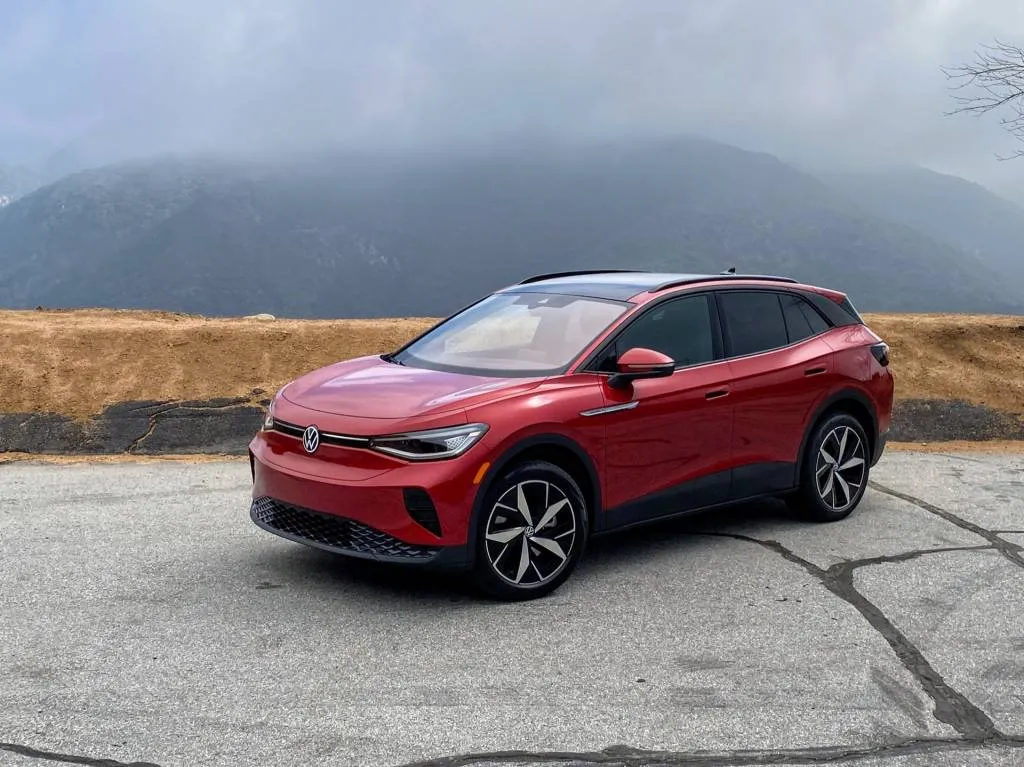
2024 Volkswagen ID.4
Efficiency remains great, by early indications. In a dual-motor Pro S AWD model, my drive partner and I averaged 3.0 miles per kwh in a fast-paced 69 miles through L.A. boulevards and freeways and then up Angeles Crest Highway and back. On a shorter, level route through boulevards with the Pro S single-motor rear-wheel-drive model, I averaged 3.5 miles per kwh—all with outside temps in the 60s.
One forewarning: The base $41,160 ID.4 Standard, with its 62-kwh battery pack (58 usable), which is only offered with rear-wheel drive, keeps the old 201-hp rear motor unit, as well as the old 12.0-inch screen. We’ll follow up with this model sometime in the near future, but for now it stands as the odd one out in the lineup.
Standard versions also fast-charge at a peak 140 kw, versus 175 kw for the rest of the lineup. In both cases, though, a 10% to 80% charging stop should take about 30 minutes.
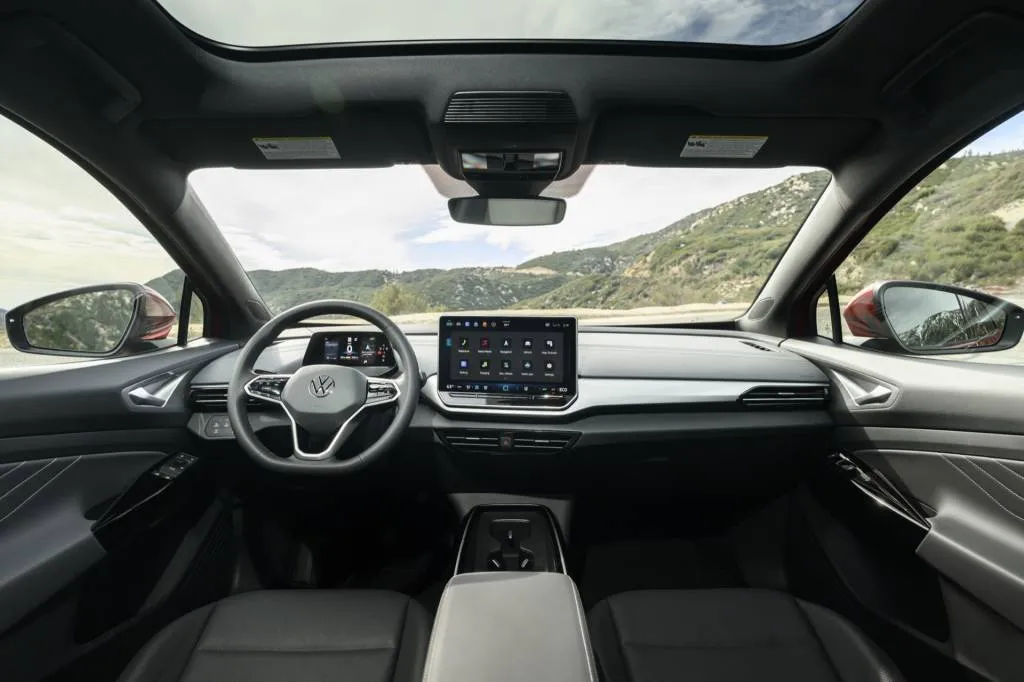
2024 Volkswagen ID.4
Dynamically superb ride, handling, comfort
If you stick to boulevards, freeways, and commuting routes, the ID.4 impresses with an almost luxury-car sophistication, with ride comfort, a quiet cabin, and soaking up harshness seemingly the main priorities here. You might bide your time with the ID.4 thinking it’s not a match for the fast corners or canyon-carving if you don’t, like us, see what happens when one does push this benign-looking crossover harder in Sport mode, which heightens its propulsion and steering responses somewhat.
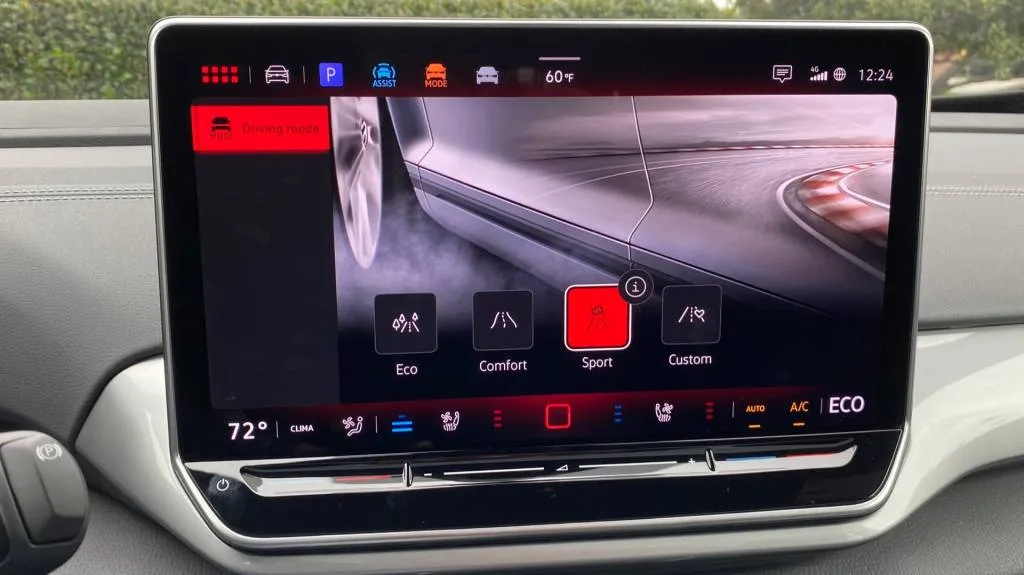
2024 Volkswagen ID.4
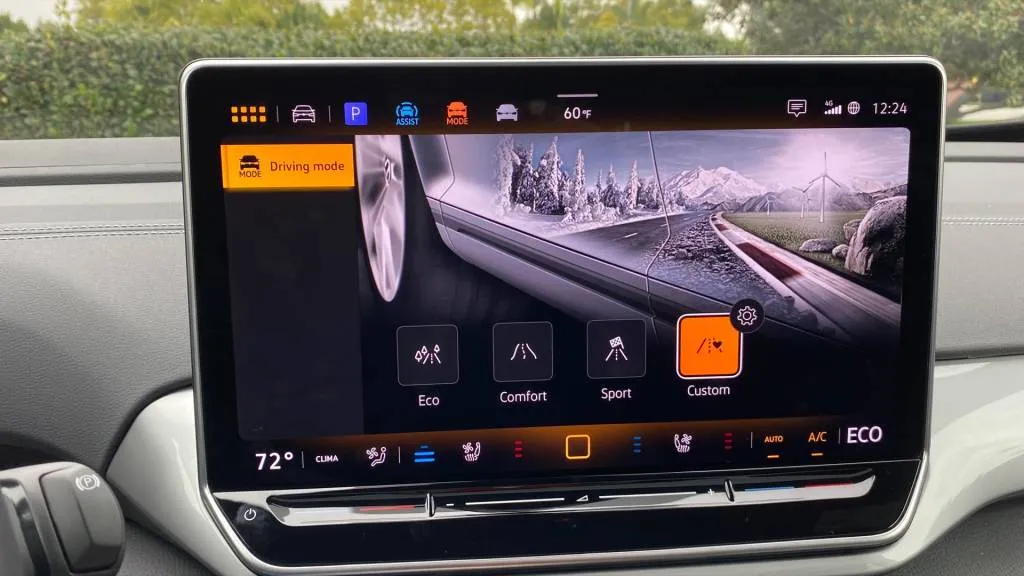
2024 Volkswagen ID.4
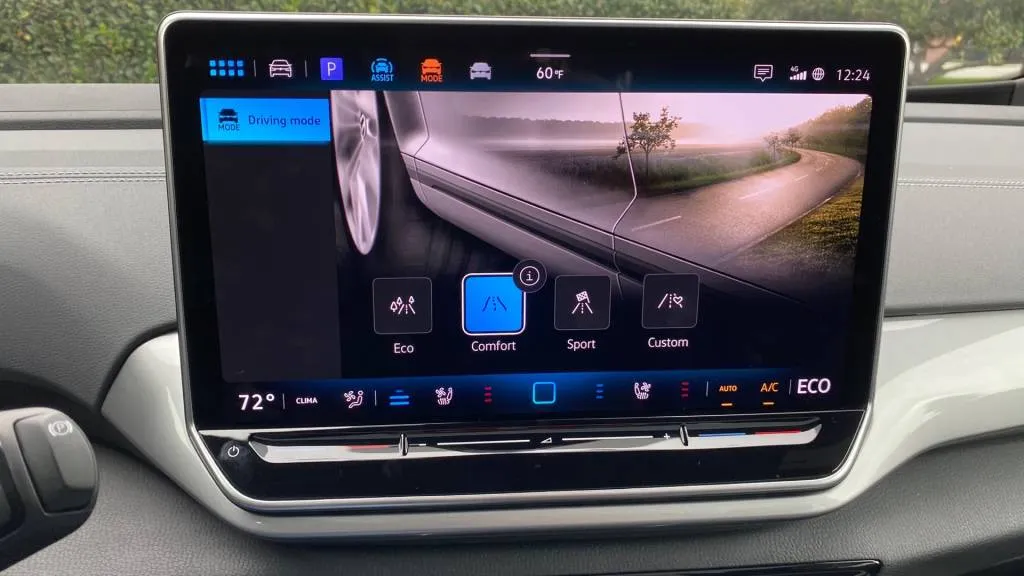
2024 Volkswagen ID.4
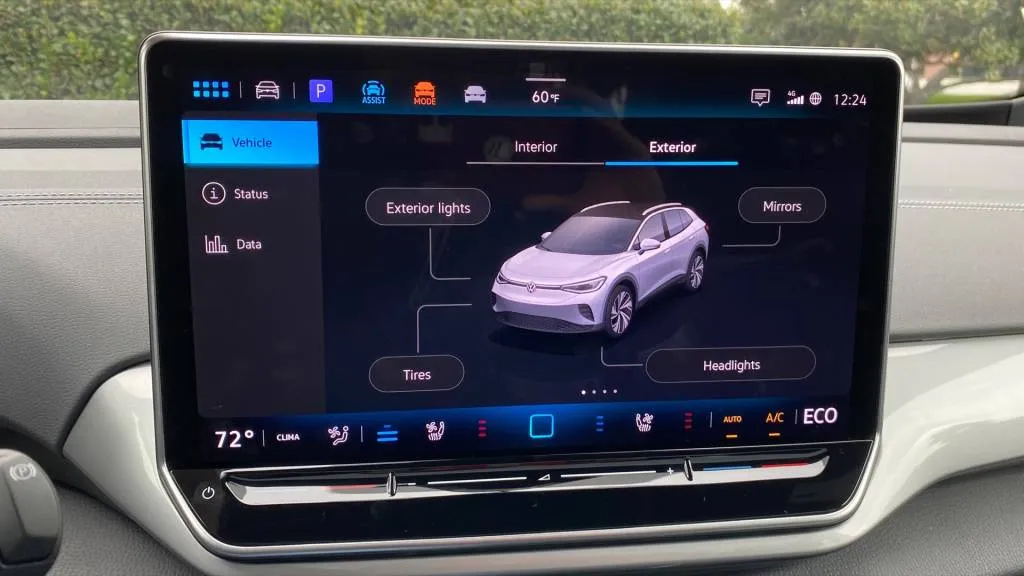
2024 Volkswagen ID.4
Once we hit California’s scenic and technically challenging Angeles Crest Highway and did that, first impressions were cast aside—with a whole lot of respect for VW’s chassis tuning. How the ID.4 manages to tune such ride and handling prowess into the package, with my test Pro S model’s rather low-profile 20-inch tires, with no use of an air suspension or adaptive damping, is a feat. All-wheel-drive models retain their near-50:50 weight distribution, and with a little more power going to the rear wheels than previously you can rotate the tail in the tightest corners when applying some extra zeal.
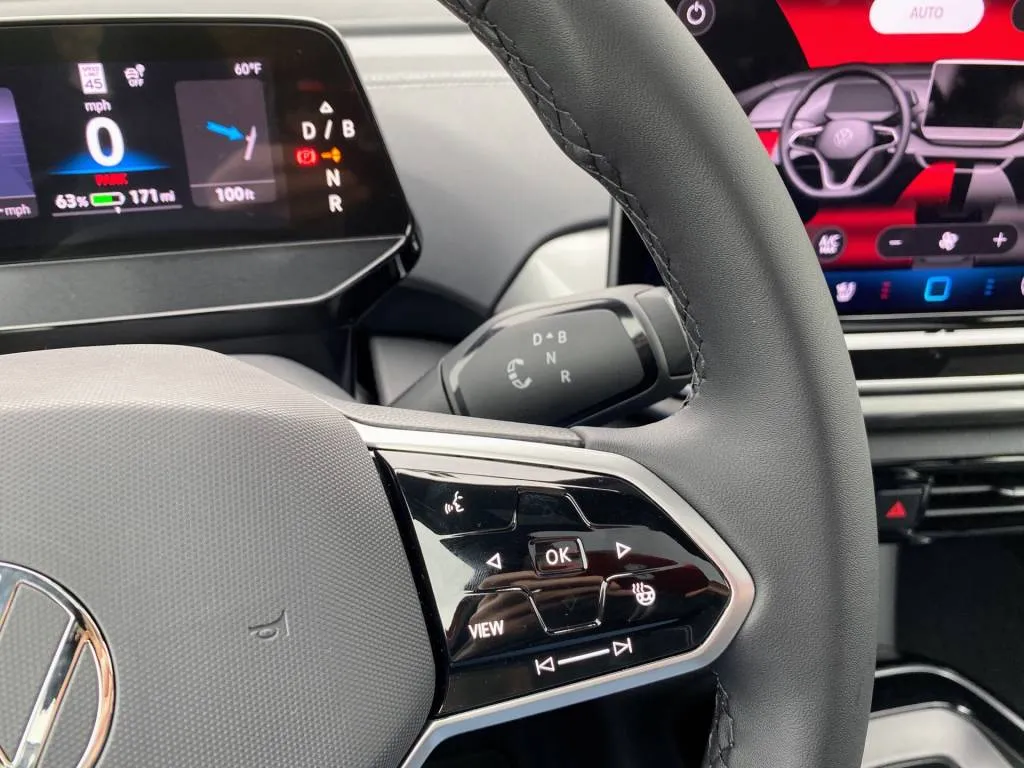
2024 Volkswagen ID.4
The ID.4 has a regenerative braking system that some drivers will find refreshingly simple and straightforward, while others might be frustrated with the lack of options. There are no paddle-shifters here with multi-level regen, like in Hyundai’s Ioniq 5, just a ‘D’ and ‘B’ setting for the shift stalk, which now still twists to shift but is no longer part of a large appendage extending from the gauge cluster. ‘D’ gets you a very faint amount of regen, allowing even more gliding than many gasoline vehicles, while ‘B’ ramps up the regen to a max of 0.13g—not a lot at all compared to other EVs, and with no dedicated “one-pedal” mode, although of course the system is recovering much more, blended in, when you do step on the brake pedal.
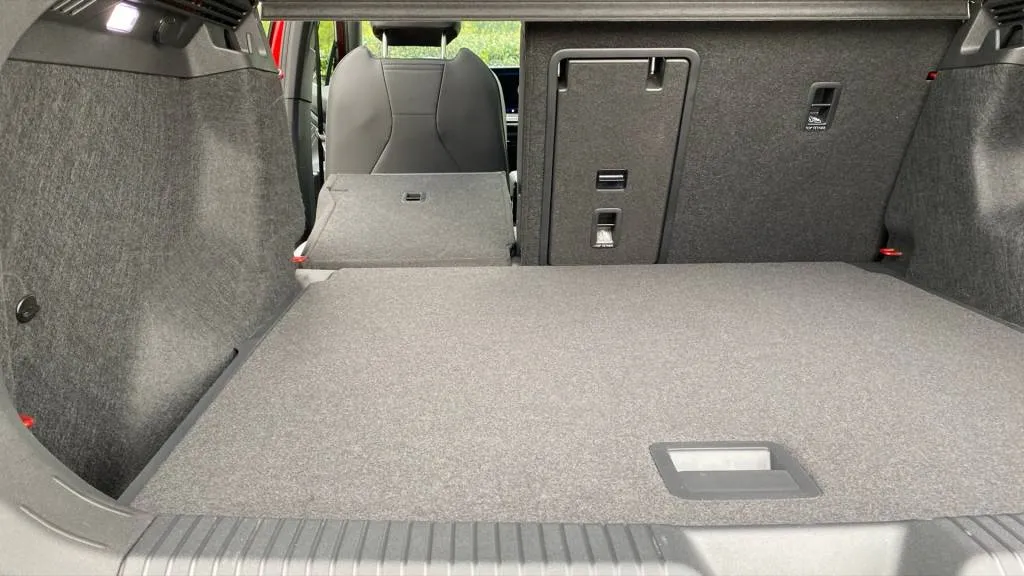
2024 Volkswagen ID.4
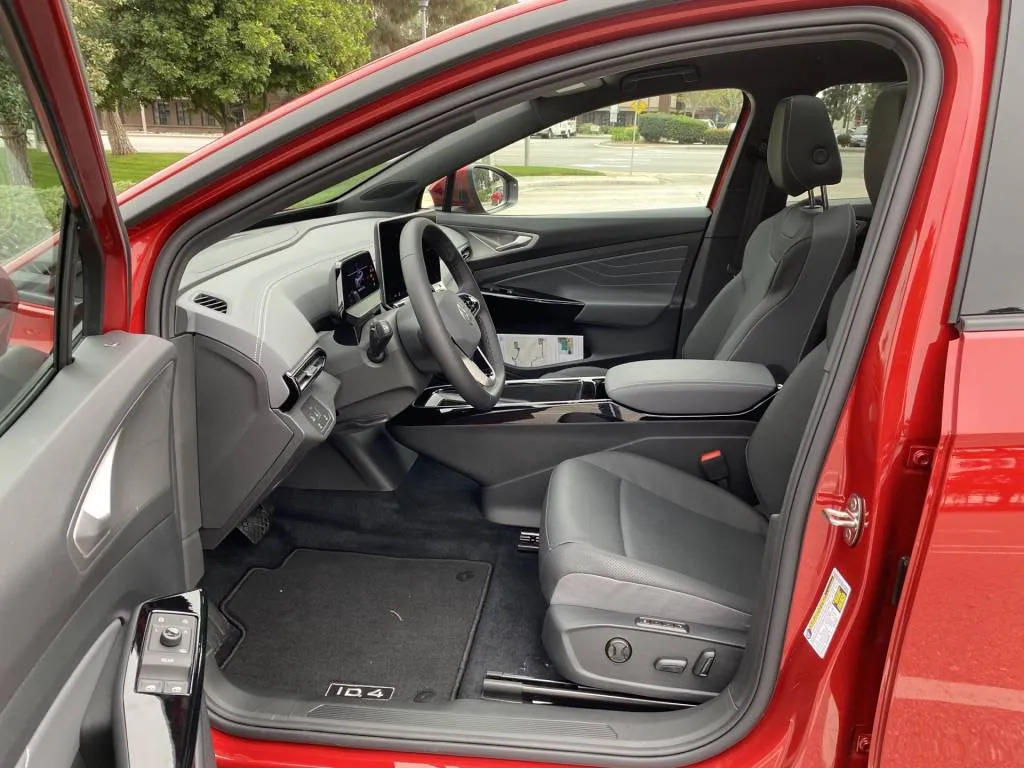
2024 Volkswagen ID.4
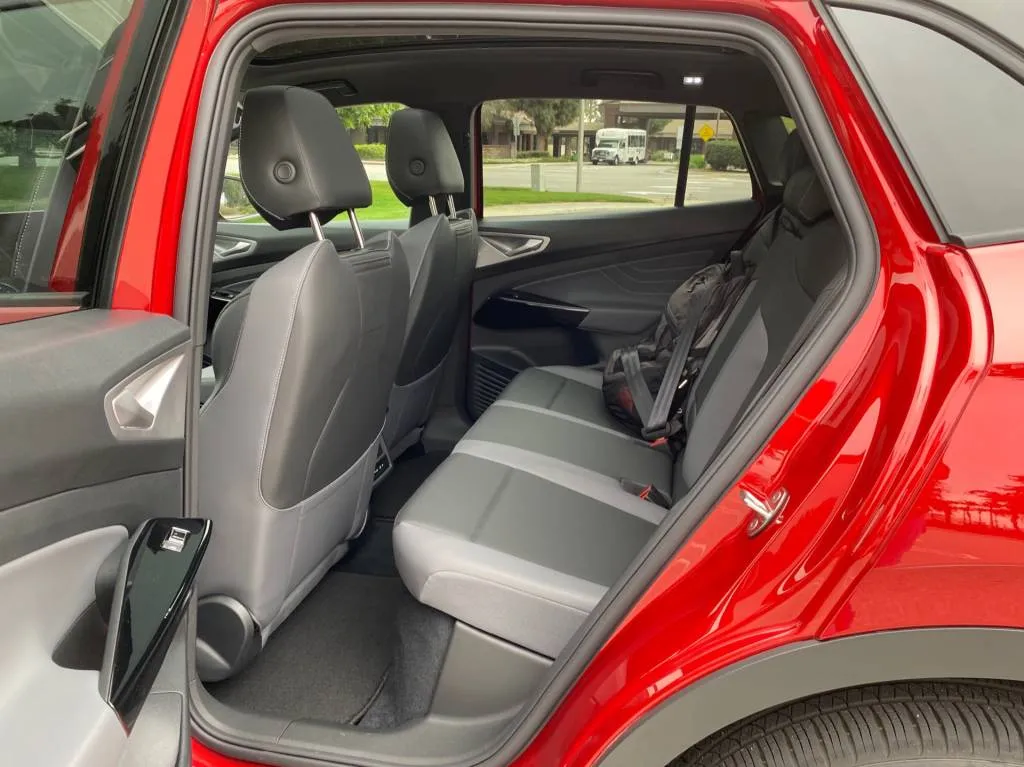
2024 Volkswagen ID.4
ID.4 is tops for seating and space
The ID.4’s seating also remains fantastic. While some EVs tend to skimp on lower cushions for the sake of shoving more battery space underneath, the ID.4’s perches can be adjusted down to a comfortable height, keep hips in place, and support the lower back. And whether it’s sliding my lanky 6-foot-6 frame into the back seat or getting a child seat in, the ID.4’s wide door cuts and generous seat padding make it one of the best.
Back to the interface, the ID.4 has the excellent ID.Light, a strobing light bar where the dash meets the base of the windshield, helping remind with color, direction, and urgency, of your next turn or active-safety alerts. It’s one of those features that, once you live with it for a few days, makes you wonder how you did without it.
The ID.4 still isn’t perfect. All the control redundancies, and the depth of selections in the interface, still make the ID.4 feel a little more complex than it needs to be. Partly, that’s the glut of submenu screens, but in all fairness those are initial impressions after a couple hours with the vehicle, and after a few days and getting comfortable with the top tray of icons and where they go, I might feel differently.
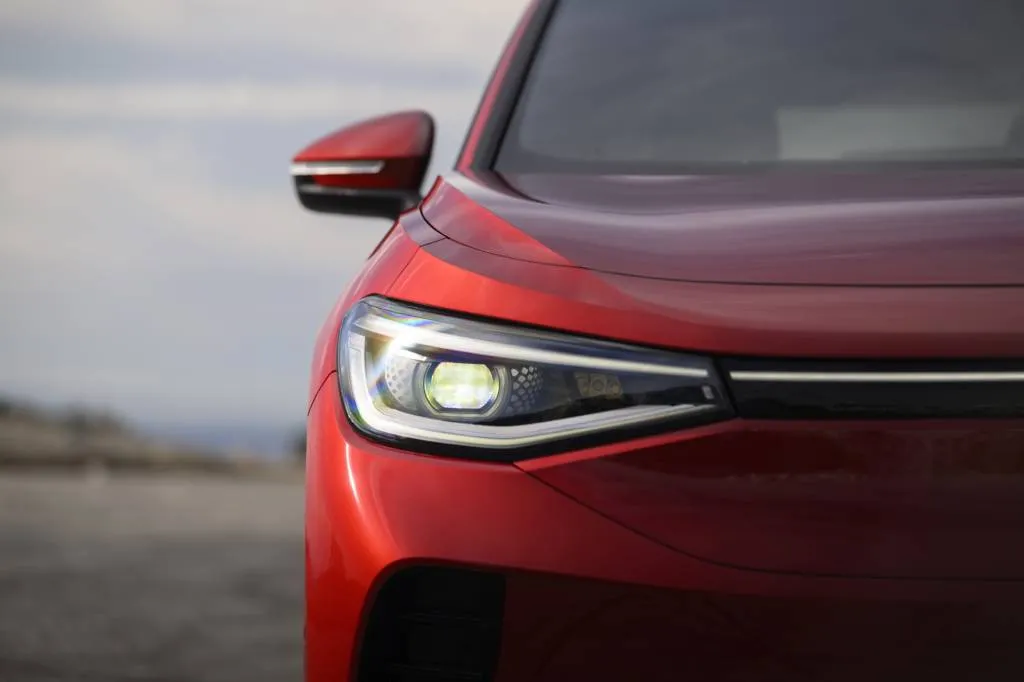
2024 Volkswagen ID.4
VW ID.4 remains a good if not great value
Prices have risen a bit, but the mid-level Pro S models we were in serve as the sweet spot for the lineup, provided you’re fine with skipping heated rear outboard seats and a rear climate zone. For a price of $51,420 with rear-wheel drive or $55,300 with all-wheel drive (plus the $395 extra for Aurora Red Metallic paint, in our tester), you get 20-inch alloys, a power rear liftgate, synthetic leather seats, more cabin lighting, and those illuminated front and rear VW logos that turn you into a rolling ad.
The latter I might be able to do without, but the fixed-glass roof that’s also included in the Pro S on up, combined with the lighter, more colorful interior combinations offered in the ID.4, make it a refreshing departure from that austere gray-on-gray Golf you might have driven years back.
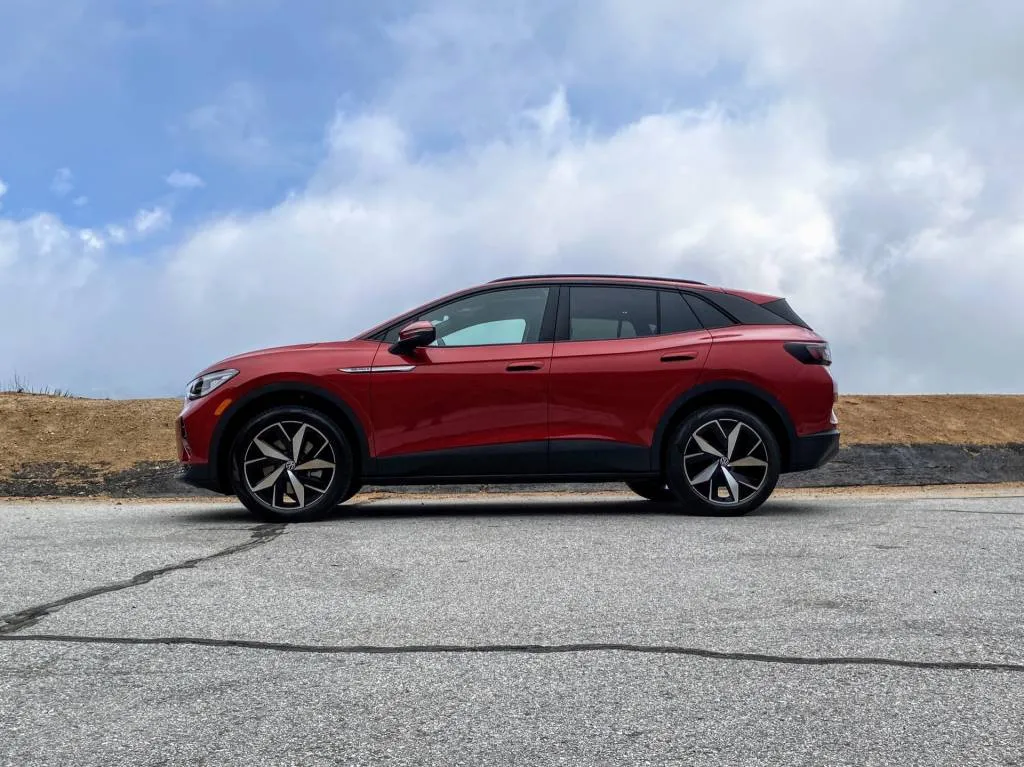
2024 Volkswagen ID.4
The ID.4 is a great package that truly will win over those mainstream-crossover families. Except for giving base-battery versions some of the same worthy upgrades, we genuinely hope VW doesn’t touch it for a few years now—now that it’s actually figured out how to set the lure.
Read the full article here



